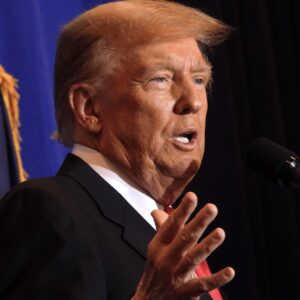I watched former president Donald Trump do his victory lap speech after the Iowa Caucuses. It really didn’t seem unusual for Trump’s trajectory in Republican politics, be it in 2016 or 2024. Trump seemed a little more conciliatory and friendlier in his comments, at least for a while.
My instinct or intuition even made me feel as if he was a bit nervous Monday night, though I can’t explain why I felt that way. But the sense stuck with me. Soon enough, I was dozing to the dull, soothing cadence of Trump’s rambling voice — like a boring, babbling brook — when he interjected one of his common asymmetrical, outlandish comments.
Speaking of the massive influx of undocumented immigrants at the Mexican border, he said, at about 10 and a half minutes in: “They’re coming from mental institutions and insane asylums. They’re being emptied out into our country. They’re terrorists. Many terrorists are coming in.”
With his soothing voice, Trump painted a dangerous picture to his supporters, who seemed to accept his perspective in stride. It was quite Trumpian. And, as usual, quite sad. The border is a huge problem. But Trump is not up to the task.
Something about the comment stuck with me. I tried to go to sleep. But Trump was in bed with me. As I reflected in the darkness, the tactics of selling a used car came to mind — set a high price and then take the best deal you can get, which may be higher than retail value.
What if these asymmetrical alarmist lines Trump often spews are not random at all but intentional and calculated? In setting a high bar for supporters to accept his alarmist rhetoric, Trump might be conditioning them to accept eventual total obedience.
By moving the goalpost for acceptance downward from radical rhetoric to less sensational commentary, he loosens any conscious objection of his supporters to his falsehoods. This is, perhaps, why many of his supporters confront critics of Trump with superficial, glancing responses. Supporters are not being ignorant. Their egos have been quietly hijacked by the drone of Trump’s artful tactics.
I speculated about that and wondered if it could be a reverse-gaslighting maneuver on the part of the former president. To explore my theory, I asked Trump’s 2028 presidential political opponent, the legend himself — ChatGPT.
The overworked digital think tank responded with this:
“Reverse gaslighting refers to a situation where an individual or entity attempts to manipulate others by making them doubt their own perceptions, memories or sanity, similar to traditional gaslighting, but in a different direction. In reverse gaslighting the manipulator may falsely claim that others are trying to deceive or manipulate them, creating a sense of confusion and distrust.”
In a follow-up DuckDuckGo search, I learned that this accusation has been made of Trump since 2016. Yesterday’s news then but perhaps not fake news? I can’t explain why this idea came to me organically on the night of Trump’s Iowa win. Maybe the term had been stuck in the back of my head from an old news article.
I wonder if Trump might not be intentionally loosening the soil around our tree of liberty with his wild comments and then subsequently conditioning the public and supporters into submission with lesser absurdities. Will our freedom be squelched like the frog in the pot who didn’t feel the heat being raised incrementally?
Archimedes supposedly said that he could move the world with a big enough lever and place to stand. Some say Trump may stand in the White House this time next year and try to upend our republic.
I don’t know if he will try or if he can. ChatGPT told me it’s not allowed to talk about politics. As for me, Trump’s voice is almost as good as melatonin, and it has been a long day. Liberty seems secure for at least the night.


